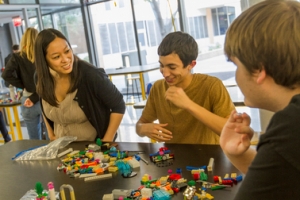ASU undergraduates have the opportunity to enroll in a challenging course this fall, designed to re-introduce the act of play as a problem-solving technique. The course is offered as part of the larger project, Cross-disciplinary Education in Social and Ethical Aspects of Nanotechnology, which received nearly $200,000 from the National Science Foundation’s Nano Undergraduate Education program.
 Engineering professor Candace Chan, a nanoscientist, checks in with undergraduate students Ruben Hernandez (aeronautics major) and Dylan Baker (mechanical engineering major) as they work on their LEGO models during a Feb. 24 pilot workshop. Photo by: Jessica Hochreiter/ASU
Engineering professor Candace Chan, a nanoscientist, checks in with undergraduate students Ruben Hernandez (aeronautics major) and Dylan Baker (mechanical engineering major) as they work on their LEGO models during a Feb. 24 pilot workshop. Photo by: Jessica Hochreiter/ASU
The project is the brainchild of Camilla Nørgaard Jensen, a doctoral scholar in the ASU Herberger Institute’s design, environment and the arts doctoral program. Participants will use an approach called LEGO Serious Play to solve what Jensen calls “nano-conundrums” – ethical dilemmas arising in the field of nanotechnology.
“LEGO Serious Play is an engaging vehicle that helps to create a level playing field, fostering shared conversation and exchange of multiple perspectives,” said Jensen, a trained LEGO Serious Play facilitator. “This creates an environment for reflection and critical deliberation of complex decisions and their future impacts.”
LEGO Serious Play methods are often used by businesses to strategize and encourage creative thinking. In ASU’s project, students will use LEGO bricks to build metaphorical models, share and discuss their creations, and then adapt and respond to feedback received by other students. The expectation is that this activity will help students learn to think and communicate “outside the box” – literally and figuratively – about their work and its long-term societal effects.
Jensen works with a team of faculty members, including Thomas Seager, an associate professor and Lincoln Fellow of Ethics and Sustainability in the School of Sustainable Engineering and the Built Environment, one of ASU’s Ira A. Fulton Schools of Engineering; Cynthia Selin, an assistant professor in the School of Sustainability and the Center for Nanotechnology in Society, housed at the Consortium for Science, Policy and Outcomes at ASU; and Mark Hannah, an assistant professor in the rhetoric and composition program in the ASU Department of English, College of Liberal Arts and Sciences.
Fifteen engineering students enrolled in the Grand Challenge Scholar Program participated in a Feb. 24 pilot workshop to test project strategies. Comments from students included, "I experienced my ideas coming to life as I built the model,” and "I gained a perspective as to how ideas cannot take place entirely in the head.” These anecdotal outcomes confirmed the team’s assumptions that play and physical activity can enhance the formation and communication of ideas.
“Technology is a creative and collaborative process,” said Seager, who is principal investigator for the grant. “I want a classroom that will unlock technology creativity, in which students from every discipline can be creative. For me, overcoming obstacles to communication is just the first step.”
Seager’s work teaching ethical reasoning skills to science and engineering graduate students will help inform the project. Selin’s research on the social implications of new technologies, and Hannah’s expertise in professional and technical communication will facilitate the dialogue-based approach to understanding the communication responsibilities of transdisciplinary teams working in nanotechnology. A steering committee of 12 senior advisers is helping to guide the project’s progress.
“Being a new scientific field that involves very complex trade-offs and risk when it comes to implementation, the subject of ethics in nanoscience is best addressed in a transdisciplinary setting. When problems are too complex to be solved by one discipline alone, the approach needs to go beyond the disciplinary silos,” said Jensen.
The ASU project will leverage LEGO Serious Play's promised “systematic creativity” in an immersive nanotechnology environment, which the team believes is a natural fit because of its micro-to-macro scale and its hands-on approach to experiential learning and deliberation.
“As we train the next generation of students to understand the opportunities and responsibilities involved in creating and using emerging technologies that have the potential to benefit society, we need to advance our capacity to teach diverse stakeholders how to communicate effectively,” said Jensen.